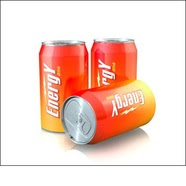A recent CDC study shows that more health promotion efforts may be needed to educate young people about the potential health dangers of consuming energy drinks. Energy drinks contain caffeine that ranges from 50 mg to 500 mg per can or bottle (compared with the average can of cola that has 35 mg), as well as other ingredients aimed at boosting energy. When used in excess, they can cause health problems such as elevated blood pressure and dehydration because of their high caffeine content. The American Academy of Pediatrics in 2011 recommended against energy drink intake by adolescents given their possible adverse health effects. | |  |
CDC researchers used data from the 2011 Youth Styles Survey to conduct this analysis. Youth Styles is an online survey that looks at health beliefs and behaviors of young people between 12 and 17 years of age on important public health topics. The following are results of a survey taken from 779 youths: - Overall, 8% of young people drank energy drinks weekly—20% wrongly perceived that energy drinks are safe drinks for teens and 13% wrongly perceived that energy drinks are a type of sports drink.
- Factors associated with energy drink intake among young people include alcohol use, increased physical activity, decreased vegetable and fruit consumption, and increased fast food consumption.
- Factors associated with the belief that energy drinks are safe drinks for teens include being male, drinking alcohol, using marijuana, and drinking non-diet soda. These findings suggest that young people who believe that energy drinks are safe are more likely to participate in unhealthy behaviors, possibly because of a lack of awareness or education, peer influence, or deliberate risk-taking behavior.
- Energy drink consumption was higher among young people who perceived that energy drinks are safe drinks for teens and that they are a type of sports drink.
Energy drinks are growing in popularity among young people with about half of the energy drink market consisting of adolescents and young adults. Given their potential harmful effects, it is important to examine how young people perceive the health risks of energy drinks. The findings fromthis study suggest that many young people wrongly perceive that energy drinks are safe and may need additional information about them. For More Information |























.png)












No hay comentarios:
Publicar un comentario